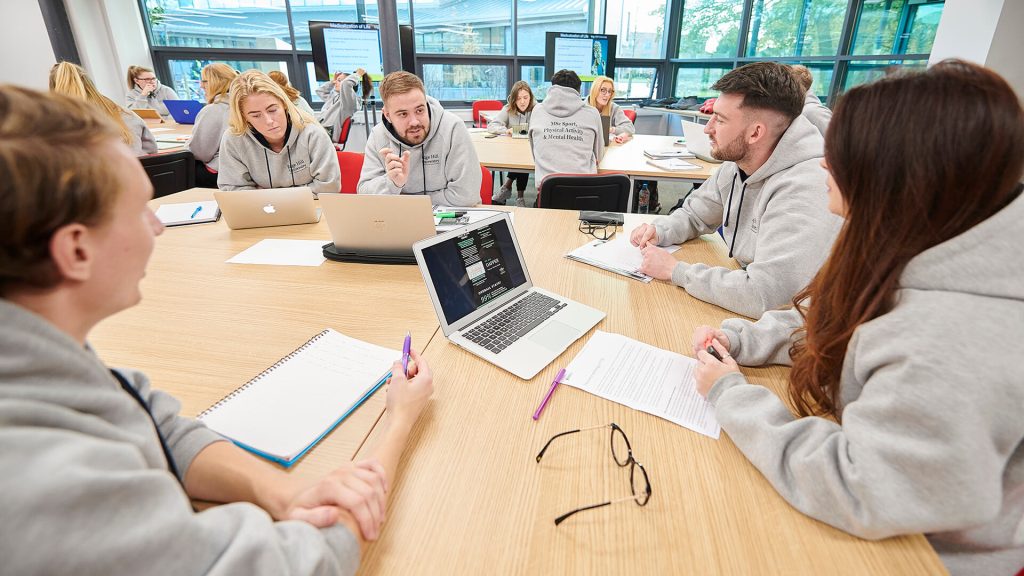Senior Wellbeing Practitioner: Children and Young People PGDip
Work in practice whilst enhancing your knowledge of interventions in learning disability and autistic spectrum disorder. You’ll graduate as a qualified practitioner, playing a key part in improving access and quality of mental health support for children and young people.
Overview
| Course length: | 2 years part-time |
|---|---|
| Start dates: | January 2025 January 2026 |
| Location: | Online study |
| Example offers: | 2:2 or above (or equivalent) and a minimum of 2 years' experience in a CYP mental health setting post qualification View full entry criteria |
| Subject(s): | Mental HealthHealth and Social Care |
| Faculty: | Health, Social Care and Medicine |
| Department: | Allied Health, Social Work and Wellbeing |

With a balance of academic and work-based learning, this PGDip Senior Wellbeing Practitioner: Children and Young People course has been designed to provide opportunities for you to complete four academic modules, whilst maintaining a clinical role in practice.
This approach to study will allow you to identify key issues in practice by applying the theoretical skills learned from the course into practice.
You will be equipped with therapeutic knowledge and practice-based skills in both clinical and case management supervision. This will focus on developing your communication skills, leadership management and knowledge of interventions in learning disability and autistic spectrum disorder practice.
This course has been developed as a direct response to the Government’s mandate which seeks to improve access and quality of mental health support for children and young people. As a Senior Wellbeing Practitioner, you will add to this core team, as well as providing development opportunities for graduates of the PGDip Education Mental Health Practitioner for Children and Young People programme.
Throughout the course, you will be exposed to research informed, evidence based teaching, and a wealth of support from writing to wellbeing.
What you'll study
Year 1 of this senior wellbeing practitioner course focuses on developing your clinical supervision skills. You will also start to reflect on intervention strategies when working with children and young people experiencing mental health difficulties, and the role which mental health services play in this.
Year 2 focuses on experiential learning as you develop your knowledge of intervention models. You will learn how to advise parents/carers and school staff when presented with difficulties such as school anxiety. The core features of Autism, Learning Disabilities and associated conditions will be considered, enabling you to develop appropriate interventions with this group.
How you'll study
This senior wellbeing practitioner course is delivered online. You will start with a two-day online induction. The induction will be delivered as a combination between live sessions and material to complete in your own time.
Attendance at online sessions is expected to be around two days per month. This includes a combination of theoretical learning and skills practice.
All taught and clinical skills sessions will be delivered using a virtual learning environment (VLE) platform. This promotes group discussions and the ability to access additional content and learning activities.
How you'll be assessed
You will be assessed through a combination of practical assessments and coursework. Coursework typically includes clinical reports and practice portfolios.
A 50% minimum pass rate applies to all elements of assessment on this course.
Who will be teaching you
The teaching team comprises of academic staff whose expertise ranges from designing, developing and delivering both undergraduate and Master’s level programmes. All academic staff within the department have, or are working towards, a recordable teaching qualification and all have achieved at least Master’s level study, with a considerable proportion having achieved PhDs. Several are research active in the subject field of mental health (research interests include: child health and wellbeing, resilience, youth offending, third sector offender management, mental health, change management and quality improvement in health and social care), or relevant related areas.
Several staff have practical experience working in the mental health sector, such as health visitors, mental health nurses, family therapists, social workers, psychologists, counsellors and psychotherapists, all of whom will have dealt with the long-term consequences of mental health issues not being addressed at an early age.
In addition to this, honorary contracts, associate tutors, secondments from clinical practice, visiting and specialist guest lecturers are an integral part of the programme delivery to ensure that specialist knowledge at this advanced level is included in the module content.
Entry criteria
Entry requirements (2025 / 2026)
You should have a minimum 2:2 undergraduate honours degree in a relevant subject or equivalent. You will also be expected to have a minimum of 2 years’ experience in a CYP mental health setting post qualification.
You must be in suitable employment to be registered on the programme. You must be employed by your sponsoring organisation and as such, all responsibilities for employment are held by the employer.
You should have completed either Education Mental Health Practitioner (EMHP) or Children’s and Young Peoples’ Wellbeing Practitioners (CYPs) training and currently be employed in one of these roles.
You are required to be an experienced practitioner, as evidenced by 2 or more years working therapeutically, clinically, or consultatively within an educational or community mental health setting, with children and young people with mental health difficulties. Applicants with less than two years’ post qualifying experience may be considered depending on previous experience.
Relevant qualifications for entry could include:-
Children and Young People’s Mental Health CYP/CYWP
PGDip Education Mental Health Practitioner
Applications will also be welcomed from those who have completed the PGCert Supervision: Children and Young People’s Mental Health & Wellbeing or the PGDip Education Mental Health Practitioner for Children and Young People supervisor programmes at Edge Hill University, whereby credits can be transferred towards the Senior Wellbeing Practitioner qualification through Recognition of Prior Learning (RPL).
This programme is only available to students who reside and work in England due to the need for employment based in a local NHS trust or third sector organisation.
An interview will form part of the selection process.
A supporting statement from your manager will also be required as part of the application process.
English language requirements
International students require IELTS 6.5, with a score no lower than 6.0 in each individual component, or an equivalent English language qualification.
If your current level of English is half a band, one band, or one-and-a-half bands lower, either overall or in one or two elements, you may want to consider our Pre-Sessional English course.
How to apply
Apply part-time
We recommend interested applicants create an account with NHS Jobs and set up an email alert to search 'education mental health practitioner'. You will then be made aware when posts go out to advert.
Successful candidates will be employed by a specific NHS trust and released to train at Edge Hill University.
Should you accept an offer of a place to study with us and formally enrol as a student, you will be subject to the provisions of the regulations, rules, codes, conditions and policies which apply to our students. These are available at www.edgehill.ac.uk/studentterms.
There’s plenty of opportunities to come take a look around campus. Attend one of our open days to see what life at Edge Hill University is all about.
Book an open day
Finance
Tuition fees
The tuition fees for students joining this course in the academic year 2024/25 are £5,520.
The tuition fees for students in their second year of this course in the academic year 2025/26 are £5,980.
Please note, the tuition fees for students joining this course in 2025/26 in their first year are not yet confirmed.
The University may administer a small inflationary rise in tuition fees, in line with Government policy, in subsequent academic years as you progress through the course.
EU/EEA and Swiss students who have settled or pre-settled status under the EU Settlement Scheme, as well as Irish nationals, may be eligible for the UK tuition fee rate.
Financial support
Please view the relevant Money Matters guide for comprehensive information about the financial support eligible to UK students.
EU/EEA and Swiss students who have settled or pre-settled status under the EU Settlement Scheme may be eligible to apply for financial support. Irish nationals can ordinarily apply to Student Universal Support Ireland (SUSI). Please see our EU student finance page for further details.
Your future career
Aligned to the NHS agenda for change, successful completion of this PGDip Senior Wellbeing Practitioner: Children and Young People course will enhance your career opportunities.
You will be equipped to offer both clinical and case management supervision, specialising in learning disability and autistic spectrum specific delivery, including providing advanced low intensity interventions .









